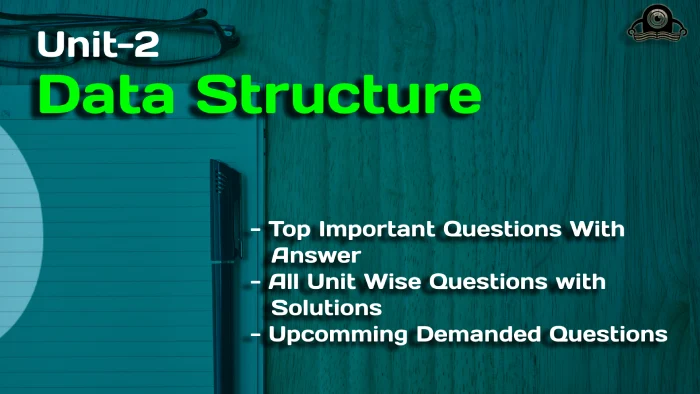This is Btech, MCA, and BCA’s common subject, “data structures.” Providing Unit -2 STACKS AND QUEUES important questions, Last year’s question paper with solutions, and many more study materials that will help students or bachelor’s exam
Dudes 🤔.. You want more useful details regarding this subject. Please keep in mind this as well. Important Questions For Data Structures : *Unit-01 *Unit-02 *Unit-03 *Unit-04 *Unit-05 *Short-Q/Ans *Question-Paper with solution 21-22
Q1. Write a C function for array implementation of a stack. Write all primitive operations.
Ans.
Q2. What is stack? Implement stack with singly linked list.
Ans. Stack:
- 1 A stack is one of the most commonly used data structure.
- 2.A stack, also called Last In First Out (LIFO) system, is a linear list in which insertion and deletion can take place only at one end, called top.
- 3. This structure operates in much the same way as stack of trays.
- 4. If we want to remove a tray from stack of trays it can only be removed from the top only.
- 5. The insertion and deletion operation in stack terminology are known as PUSH and POP operations.
Implementation using singly linked list:
Q3. Write a function in C language to reverse a string using stack.
Ans.
Q4. Consider the following infix expression and convert into reverse polish notation using stack. A + (B * C- (D/E A F)* H)
Ans.
Q5. Write the procedures for insertion, deletion and traversal of a queue.
Ans. 1. Insertion:
Insert in Q (Queue, Max, Front, Rear, Element)
Let Queue is an array, Max is the maximum index of array, Front and Rear to hold the index of first and last element of Queue respectively and Element is value to be inserted.
Step1:If Front = 1 and Rear = Max or if Front = Rear + 1
Display “Overflow” and Return
Step2: If Front = NULL [Queue is empty]
Set Front = 1 and Rear = 1
else if Rear = N, then
Set Rear = 1|
else
Set Rear = Rear +1
[End of if Structure]
Step 3: Set Queue [Rear) = Element [This is new element
Step4: End
2. Deletion:
Delete from Q (Queue, Max, Front, Rear, Item)
Step1:If Front = NULL [Queue is empty]
display Underflow” and Return
Step 2: Set Item = Queue [Front]
Step 3: If Front = Rear [Only one element}
Set Front = Rear and Rear = NULL
Else if
Front = N, then
Set Front =1
Else
Set Front = Front+ 11
[End if structure]
Step 4: End
3. Traversal of a queue: Here queue has Front End FE and Rear End RE. This algorithm traverses queue applying an operation PROCESS to each element of the queue:
Step 1: [Initialize counter] Set K=FE
Step 2: Repeat step 3 and 4 while K≤RE
Step3: [Visit element] Apply PROCESS to queue [K]
Step 4: [Increase counter] Set K= K+1
[End of step 2 loop]
Step5: Exit
Q6. What is a circular queue? Write a C code to insert an element in a circular queue. Write all the condition for overflow.
Ans. 1. A circular queue is one in which the insertion of a new element is done at the very first location of the queue if the last location at the queue is full.
2. In circular queue, the elements Q[0], Q[1], Q[2]…Q[n-1] is represented in a circular fashion.
For example: Suppose Q is a queue array of six elements.
3. PUSH and POP operation can be performed on circular queue. Fig. will illustrate the same.
C code to insert an element in circular queue:
void insert ()
{
int item;
if(front ==0 && rear == Max – 1)||((front = = rear + 1))
{
printf(“Queue is overflow \n”);
Return;
}
if(front == -1) /*If queue is empty*/
}
front = 0;
rear = 0;
}
else
if(rear== Max – 1) /*rear is at last position of queue*/
rear = 0;
else
rear = rear + 1;
printf(“Input the element for insertion:”);
scanf (“%d”, &item);
cqueue [rear] = item;
}
Conditions for overflow: There are two conditions:
1. (front = 0) and (rear = Max – 1)
2. front = rear + 1
If any of these two conditions is satisfied, it means that overflow occurs.



Most Important Question For All Units | Short Questions Series |
Cracking AKTU B.Tech: Quantum Data Structures – Last Year’s Short Questions Paper
| Important Question | Question Links |
|---|---|
| Data Structure – Unit-1 | UNIT-1 |
| Data Structure – Unit-2 | UNIT-2 |
| Data Structure – Unit-3 | UNIT-3 |
| Data Structure – Unit-4 | UNIT-4 |
| Data Structure – Unit-5 | Unit-5 |
| Important Short Questions- Data Structure | Short Question List |
| Last Year’s Question Paper | Exam 2021-22 |
| Quantum -Data structure | Quantum |
AKTU Important Links | Btech Syllabus
| Link Name | Links |
|---|---|
| Btech AKTU Circulars | Links |
| Btech AKTU Syllabus | Links |
| Btech AKTU Student Dashboard | Student Dashboard |
| AKTU RESULT (One VIew) | Student Result |
Important Links-Btech (AKTU)| Data Structures Syllabus
| Label | Links |
|---|---|
| Btech Information | Info Link |
| Btech CSE | CSE-LINK |
| Quantum-Page | Link |
| Data Structure Syllabus | Syllabus-DS |

4 thoughts on “Data Structures AKTU’s Unit-2: Important Questions on Stacks and Queues”